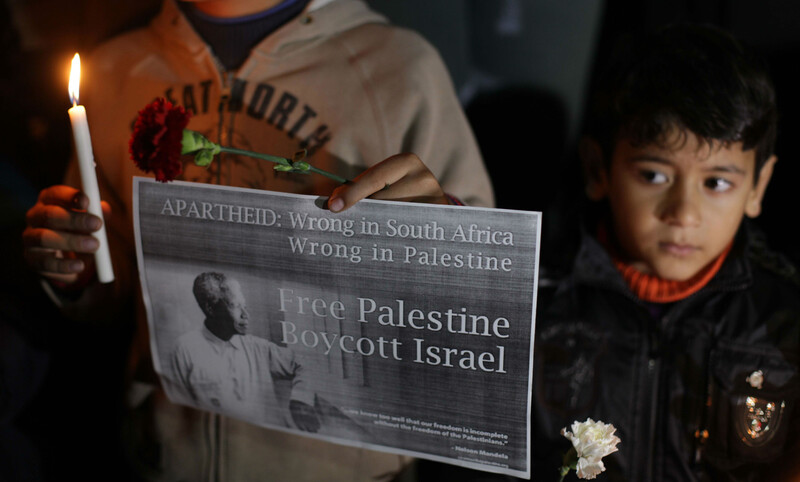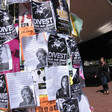The Electronic Intifada 2 December 2014

The 2005 call for BDS from Palestinian civil society was both an acknowledgment and a call for solidarity.
APA imagesThis week UAW 2865, representing thirteen thousand student workers across nine University of California campuses, could become the first labor union in the US to join the Palestinian-led movement for boycott, divestment and sanctions (BDS) against Israel.
The union’s 4 December vote comes in the wake of a momentous period of organizing for BDS on college campuses and within scholarly associations — a process marked by a spectacular victory for our side when the American Studies Association voted overwhelmingly for BDS in December 2013. This followed the Asian American Studies Association, which in April 2013 became the first scholarly association to adopt BDS.
This is despite, and in response to, the violence unleashed by Israel on Palestinian lives and homes during the summer in the genocidal military campaign against Gaza.
One way to judge our success would be by the measure of outrage of Zionist organizations, such as the Anti-Defamation League.
The Anti-Defamation League has made an alphabetical list of all university campuses that in 2014 considered or voted on BDS. That number, just for 2014, was an impressive fifteen, of which five student governments actually passed a BDS motion, usually by huge majorities.
“Perhaps more disconcerting,” according to the Anti-Defamation League, was “the extent to which support for BDS has seeped into the realm of scholars.”
Following the American Studies Association vote, several scholarly organizations — including the Peace and Justice Studies Association, the Modern Language Association and the National Women’s Studies Association, among others — have either passed or are considering voting on BDS resolutions.
As it turns out, 4 December — the day the UAW 2865 will be voting on BDS — marks the first anniversary of the American Studies Association victory.
Tactic of the dispossessed
Undoubtedly, the lead-up to the vote and its aftermath will see an escalation of Zionist propaganda against BDS. So it is important to make two points as we organize towards the future:
First, that historically, boycott is a tactic used by the dispossessed against the powerful.
This is not a new tactic. Boycott has deep roots in anti-imperialist struggle, internationally.
Palestinians stand alongside other anti-imperialist fighters whose rich and fierce history of struggle is worth recalling today — not simply because it ought to be part of our collective historical memory, but also because they won against their oppressors.
Second, that the tactic of BDS presents particular difficulties for Israel and its allies, because it is an international movement and not tied to particular nation states or their rulers.
The 2005 call for BDS from Palestinian civil society was both an acknowledgment and a call for solidarity.
It was an acknowledgement the Palestinian people could no longer depend on Arab ruling elites to deliver a just victory due to their compromises with neoliberalism and US imperialism.
Consequently, it was a call for solidarity to those Palestinians could rely on: an international citizenry who could stand with them, often against their own home governments.
Both these features of BDS deserve unpacking.
Isolating imperialists
Boycott, as a tactic of resistance, derives its name from one Captain Charles Boycott.
Boycott was a land agent in nineteenth century Ireland managing the estates of a large landowner, Lord Erne, in County Mayo. Boycott was known for his singular cruelty and ruthlessness towards the Irish people who worked on his land.
But all did not go well for Captain Boycott in history. When Boycott tried to evict his Irish tenants in 1880, the workers, organized by the Irish Land League, led a “boycott” of Charles Boycott.
The entire community participated in the campaign to isolate the imperialist. Workers stopped work on his land, shops refused to serve him; he even failed get anyone to do his laundry.
Boycott finally left Ireland in 1880 but not before he gave us the verb “to boycott” in celebration of the hundreds of ordinary Irish people who kicked him out of their land.
The next successful mass boycott campaign was the Swadeshi movement in Bengal in British-occupied India. At a packed town hall meeting in Calcutta on 7 August 1905, leading nationalists of Bengal called for a boycott of all British goods and institutions to protest the then Viceroy Lord Curzon’s decision to partition Bengal and fuel Hindu-Muslim religious tensions.
The decision of the Bengali nationalists to boycott the colonial power was, again, rooted in internationalism. Its inspiration came in part from the Chinese boycott of American goods in protest against racist immigration laws — a tactic noted as worthy of emulation by radical Bengali nationalists.
The boycott of 1905 blossomed into a full-scale passive resistance campaign, marked by public burnings of British goods, boycott of British schools, colleges, law courts and places of work and a demand for full independence from colonial rule.
Activists and volunteers addressed massive rallies, organized lectures in villages, composed beautiful songs and poems about the motherland, wrote street plays and even set up their own arbitration courts as parallel judiciaries to the British law courts.
Lord Curzon, known for his racism and imperial arrogance, was forced to revoke the partition and ultimately return to England.
The year 1905 proved to be an inspiration and part-blueprint for the subsequent Gandhian movement of the 1920s and later. In fact the economic boycott of British goods proved to be far more intense in the 1921-22 and 1930s campaigns, worrying the major industrialists in Britain.
Hallmark of freedom struggle
The boycott of British goods and institutions became a hallmark of the Indian freedom struggle in general, inspiring similar tactics internationally — notably in South Africa.
Throughout the 1950s the African National Congress and its allies spearheaded various boycott campaigns against the apartheid state. A 1958 paper by the ANC’s national executive argued that “new methods of struggle must emerge … we can no longer rely on the old forms.”
The movement gained international support slowly through the 1960s, passing through acts of brutal violence of the South African state such as the Sharpeville massacre and despite tenacious opposition from the US and British governments in the 1980s.
Margaret Thatcher, the British prime minister, called the ANC a “terrorist organization.” Her spokesperson, Bernard Ingham, famously declared that anyone who believed that the ANC would ever form a government in South Africa was “living in cloud cuckoo land.”
And yet, Nelson Mandela walked out from 27 years of imprisonment into the South African sunshine in February of 1990 — marking the beginning of the end for white minority rule.
Boycott worked.
Boycotting a settler colonial regime, then, has a proud anti-imperialist history and long history of success.
The ANC revolutionaries called the strategy a “devastating weapon” when wielded in concert with “sympathetic organizations overseas.” And rightly so.
Unlike the South Africans and Indians, the Palestinians in historic Palestine do not have the same strategic power over the Israeli state.
In South Africa and India if the indigenous people — Black South Africans and Indians — stopped all work for and with the colonial regime, the regime would fall. The colonized outnumbered the colonizers by several counts.
This is not the case in Palestine.
Palestinians living in the state of Israel now form a minority population, compared to the Israeli settler-colonial population — all the more reasons why the right of return for Palestinian refugees ought to be an absolutely non-negotiable demand. In historic Palestine overall, the Israeli Jewish and Palestinian populations are roughly equal in number.
This means that numerically, Palestinians, within Palestine, cannot pose the same strategic pressure on the settlers as their Indian or South African counterparts could.
But the rest of us can.
We are many
The rest of us who stand for justice in Palestine can honor the call for solidarity from Palestine and campaign for boycott, divestment and sanctions against the apartheid state of Israel.
In my mind, there is no question that Palestinians have provided the fighting edge to the struggles of the late-twentieth century. I would even go as far as to say that the intifadas — uprisings — in particular and the Palestinian resistance in general provided the inspiration and confidence for what came to be called the Arab Spring.
But they cannot win this fight in isolation, and this is not just their fight.
First, there is the fact that Palestinians are largely an unarmed population resisting a state that is one of the most militarized states on the planet and which uses deadly force on everyone, including infants, with impunity.
Second, most of Israel’s arms are supplied by countries of the global North, the US leading that list. This means we can put pressure on our own governments to stop the genocide in Palestine.
We can block Israel’s boats, we can pass BDS resolutions in our student governments, in our labor unions and in our professional organizations. We can force companies to close their factories on illegally occupied Palestinian land.
We can do all this because numerically, we are many. And the people who uphold Israeli apartheid may be powerful, but they are few.
If Israeli apartheid falls, it will not just be a victory for Palestine. Because it will be such a massive blow to global imperialism, it will be a taste of liberation for all of us.
This is why it is important to remind ourselves of the rich and deeply internationalist tradition of boycott, as we get ready to introduce BDS resolutions in our schools, unions and community organizations.
Just like the UAW 2865 will on 4 December.
Because boycotts have a history of winning.
Tithi Bhattacharya is a professor of South Asian History at Purdue University, a long time activist for Palestinian justice and a member of the editorial board of the International Socialist Review.




Comments
The MLA has NOT considered a BDS resolution
Permalink Rosemary G. Feal replied on
The MLA has NOT passed a BDS resolution, nor is the association considering voting on a BDS resolution at the January Delegate Assembly meeting. It's crucial to keep the facts straight. There was a convention session on BDS and a resolution (that wasn't ratified) calling for the State Department to contest Israel's denial of some visas. I advised Tithi Bhattacharya of her misstatement by email.
Rosemary G. Feal
Executive Director
Modern Language Association